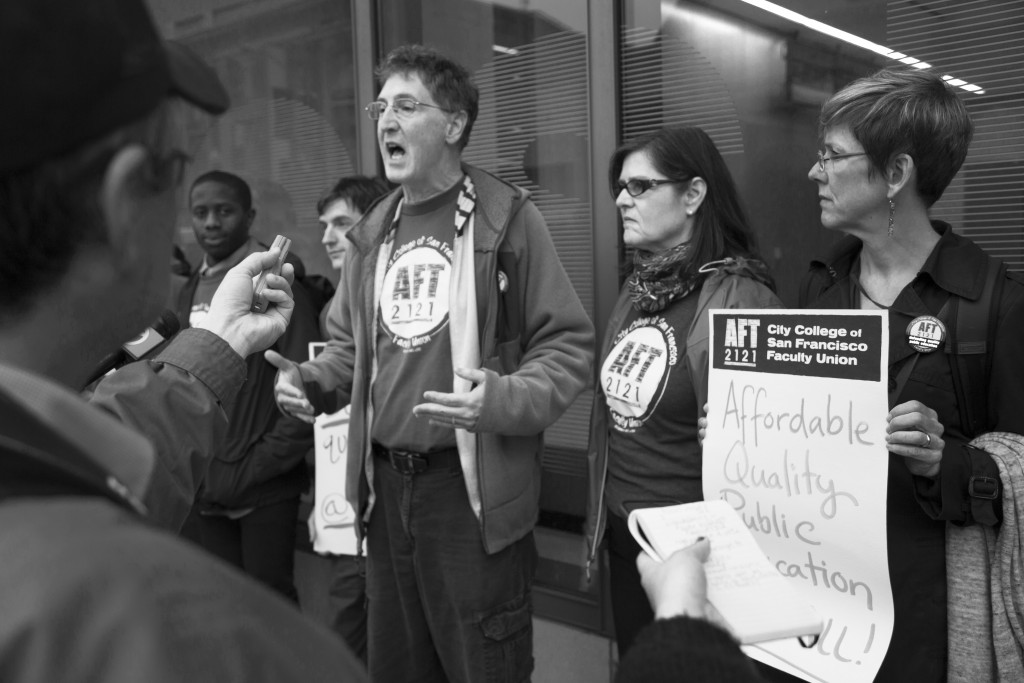Vexed Teachers May Strike For Higher Wages

By Audrey Garces
Hoping to deliver a “wake-up call” to the district, the president of American Federation of Teachers (AFT) Local 2121 announced on March 10 that union members voted 92 percent in favor of the union executive board’s call for a strike.
“Today we stand united for a strong City College—for the community, for students, for faculty,” AFT Local 2121 President Tim Killikelly said during a press conference outside the college’s Chinatown Center.
City College faculty have been working without a contract for nine months. According to the union, they are paid 3.5 percent less than their 2007 wages while the Bay Area costs of living continue to rise.
A mediation process is underway between AFT Local 2121 and the San Francisco Community College District. The district is synonymous with City College’s administration, marketing and public information director Jeff Hamilton said.
Although details of the most recent negotiations remain confidential, Killikelly called the district’s proposals in past sessions “unacceptable.”
However, City College administrators called the strike vote “premature,” the San Francisco Examiner reported on Feb. 25.
“Deciding to take a strike vote before we have even gone through fact-finding—the next stage in the process—signals a disheartening lack of receptiveness to finding a resolution,” the college’s Employee Relations office published in a letter on March 2.
Overwhelming Support
More than 800 union members casted ballots between Feb. 25 and March 8. It was the local chapter’s highest turnout of voters since 1978 when the college faculty first voted for AFT representation.
“People need education, they want education. We want to provide it,” part-time English as a Second Language (ESL) instructor Kate Frei said. “The resources are there. It’s time for them to give us the resources.”
San Francisco is growing, so opportunities for City College students should too, Killikelly said.
“We have gotten support from students all around City College. They voted unanimously at the Ocean Campus to support our efforts for a fair contract,” Killikelly said.
Killikelly followed by questioning the logic of not having “competitive salaries” for faculty.
“I think faculty and staff at City College have had a really rough time, now approaching a decade,” Board of Trustee President Rafael Mandelman said. “There’s a lot of frustration and I think that is pretty clearly being expressed.”
A Complex Issue
Killikelly and other union members at the press conference also voiced their concerns regarding the district’s proposed 26 percent cuts to classes over the next six years. He made the point that San Francisco is a growing city, so it does not make sense to shrink the college to three-fourths its current size.
“We as a faculty, in unity with the community and students, are saying you need to come up with a better plan,” Killikelly said.
The district said the college will face a $24 million funding decrease per year once Sen. Mark Leno’s stabilization bill ends in June 2017.
“The board has a strong desire to pay faculty fairly and have pay scales that attract and retain the highest quality teachers, including those we currently have,” Trustee Amy Bacharach said. “However, we also need to balance that with our fiscal reality.”
Enrollment has dropped by tens of thousands since June 2013, when the Accrediting Commission of Community and Junior Colleges took action to terminate the college’s accreditation.
Mandelman said the issue is further complicated by the accreditation crisis, creating a “revolving door” of short-term administrators.
“I don’t know that there’s anyone at the college and administration or on faculty or staff, or certainly on the board, who wants to shrink the college,” Mandelman said. “But we are going to have a question about how we pay our bills, starting in about a year and a half, when we lose the Leno funding.”
Prospective Impact
The union, the board and the district all said that a strike is not ideal.
ESL faculty member Lu Marla Dea said downsizing the college will greatly impact students and the community.
“A strike will have a severe impact on our students by disrupting class schedules, graduation and possibly their ability to transfer to four-year institutions,” the district said.
Faculty have not taken the strike authorization vote lightly, a union member reiterated at the press conference.
“We still hope that the district understands how serious we are. We do not want to go on strike unless we need to,” Killikelly said. “We understand that strikes have consequences for everybody.”
To prepare for the possible strike, the union voted last September to increase dues and form a Strike Hardship Fund Committee to appropriate grants and offer interest-free loans to financially vulnerable faculty members.
Killikelly would not disclose a specific date for the potential strike.
“We need to give faculty a raise, and we need to give staff a raise,” Mandelman said. “We also need to explore every opportunity that we can to grow the institution and find new funding for it.”
Contact a reporter
Send an email to: Audrey Garces or tweet @AudreyGarces
